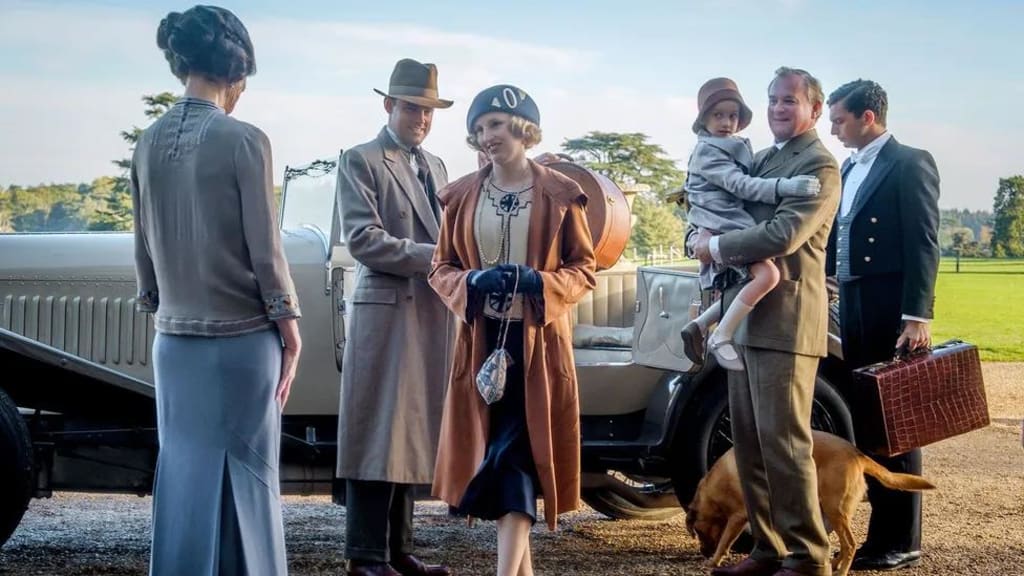Film review: Downton Abbey
The popular TV show has been adapted for the big screen, and the result is “delightful fun, even though the plot is obvious almost to the point of stupidity”

If you’re going to elevate the social world of Downton Abbey’s aristocratic Crawley family, you really have nowhere to go but up to the king and queen. As this cheerful movie picks up from the hugely popular television series, King George V and Queen Mary visit Downton. It is 1927, soon after the show’s story ended. There is no mention of the royal guests’ then-baby granddaughter, who would grow up to be Elizabeth II.
That plot means the film leans fiercely into the premise that made the show so appealing. With elegance and glittering production values, it offers the now-familiar fantasy of an orderly, graceful world, the kind that is especially soothing in our own chaotic social and political moment.
That fantasy was always based on a lie, of course. We may love Mrs Patmore (Lesley Nicol), but who wants to be her, cooking below stairs in that steaming kitchen? Instead, Downton leaves its audience dreaming of an aristocratic life – where they might be as beautiful as Cora, Countess of Grantham (Elizabeth McGovern) and Lady Mary (Michelle Dockery); as humane as the Earl of Grantham (Hugh Bonneville); and have a relation as wonderfully witty as Violet, the imperious but secretly tender Dowager Countess (Maggie Smith).
There are big hearts all around. But mostly it’s glamour, manners and wealth
The film is delightful fun, even though the plot is obvious almost to the point of stupidity, and there are few surprises for the well-known characters, some of whom are handed unnecessary subplots to give everyone some screen time. No matter. The movie is so sumptuous and enticing that it’s possible to overlook its many cinematic flaws. It fulfils the longing not just for a lost age, but for a television show brought back to life.
The sense that the Crawleys’ charmed world was on its way out became more prominent through the series. Despite some half-hearted nods toward a more egalitarian future, though, Downton the movie is more intent than ever in glorifying ‘the old days’. Yes, there are big hearts all around. But mostly it’s glamour, manners and wealth.
Written by Julian Fellowes, who created and wrote the series, the film makes a few stabs at big-screen spectacle, including a regimental parade on horseback. But mostly it concentrates on the details of everyday life that made the small-screen Downton work, while ramping them up. A royal visit means more china, more crystal, more silver to polish! Mary’s hair is fashionably bobbed and her clothes have a svelte 1920s look. There is personal intrigue upstairs and down.
The Crawleys are honoured by the royal visit, although Mary is also a bit resentful about the expense. She is constantly worried about keeping the estate afloat as the economy shifts and the class structure begins to crumble beneath their feet. The servants, on the other hand, are positively giddy at the idea of cooking for and serving the king and queen. Carson (Jim Carter), in retirement, has been pottering around the garden at the cottage he shares with his wife, Mrs Hughes (Phyllis Logan), who is still the faithful Downton housekeeper. Of course, Carson is called back to be butler for the king and queen’s visit. No one else would do. Molesley (Kevin Doyle), who has been teaching, becomes a footman again just so he can serve the royals. His over-the top enthusiasm is played for comedy, but make no mistake: the film’s heart is with the establishment.
What is new in the film works less well than what is familiar. Lady Maud Bagshaw (Imelda Stanton), lady-in-waiting to the queen and a Crawley cousin, has had a long-simmering feud with Violet. Maud arrives with a young woman named Lucy (Tuppence Middleton), nominally a servant but more of a companion, who becomes a romantic interest for Tom (Allen Leech). It’s unbelievable that we would all spot the obvious Maud-Lucy secret before anyone on screen, but there it is. Plotting was never Fellowes’s – or Downton’s – strength.
The plot is even creakier downstairs. When the servants are told that their majesties will be bringing their own chef, valets and maids, displacing the loyal Downton staff, every nose is out of joint. The royals’ minions – who certainly do not think of themselves as such – are more snobbish toward the Downton staff than the Crawleys would ever dream of being. This leads to a preposterous, eye-rollingly bad subplot, in which Anna (Joanne Froggatt), the usually clever maid, masterminds a ludicrous plan to get even.
Mary remains the most convincing character
There is even a brief action sequence that evokes a pale version of Hitchcock’s early spy thrillers. A mysterious man (Stephen Campbell Moore) appears in town and in one sequence runs through the streets chased by Tom, who in turn is chased by Mary. But the true action in Downton was always about social mobility, and moving up means getting a title. Lady Edith (Laura Carmichael), or ‘Poor Edith’ as she was widely known to Downton fans, is now a Marchioness, but she is still a drip, whiny and self-pitying. Isobel (Penelope Wilton), once the middle-class Mrs Crawley, is as commonsensical as ever, but has married for love and done it so well that she is now Lady Merton. She and the Dowager have some of the film’s best scenes together, scheming away. Violet’s lines are slightly less pointed than before, but she does have her moments. “We met by chance,” Tom says when explaining how he ran into Lucy, to which the Dowager says, “What simpletons men are!”
Mary remains the most convincing character, even if her marriage to Henry (Matthew Goode) – a racing driver turned used-car businessman – seems a touch too common for her. We get little insight into that marriage because Henry is off at a car show in Chicago for most of the film.
In one lovely, teary scene near the end, Mary tells the Dowager, “Oh, Granny, I love you so much.” Those of us who agree with her will savour every minute of Downton Abbey, even the flawed ones. At another moment Mary says, “You’re a good friend to me, Anna,” and Anna answers, “I hope we’re good friends to each other, m’lady.” The film’s creators, and on some level the characters, surely recognise the absurdity of having to use the proper “m’lady” for your friend, but that odd imbalance never rises to the surface in this dreamy, retro world.
About the Creator
Alessandro Algardi
"She was a girl who knew how to be happy even when she was sad” and that's important you know.






Comments
There are no comments for this story
Be the first to respond and start the conversation.